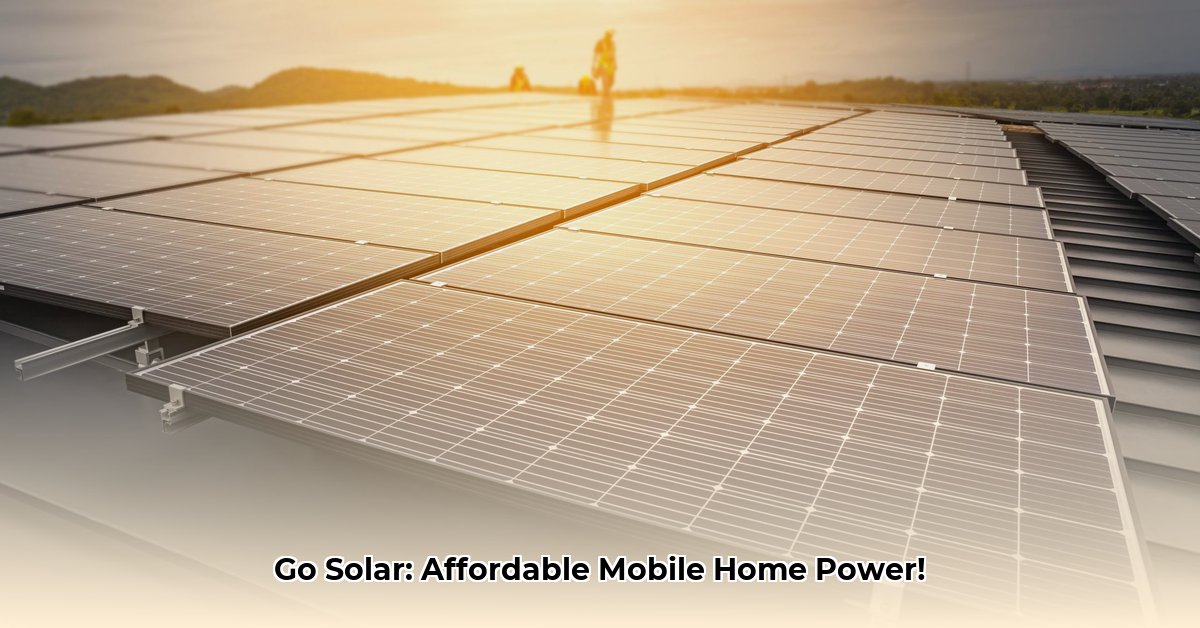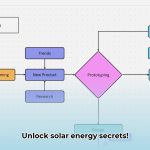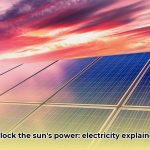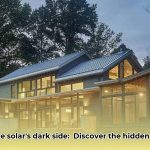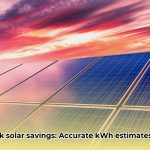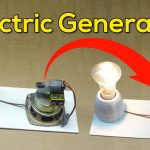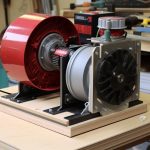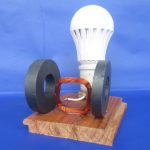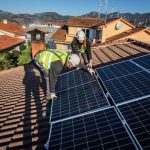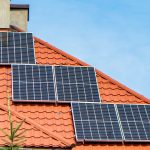Tired of unpredictable energy bills? Solar power offers a stable, affordable, and environmentally friendly solution for mobile homeowners. This comprehensive guide will walk you through every step, from understanding your energy needs to enjoying the benefits of a solar-powered life. Discover how to choose the right system, find qualified installers, navigate financing options, and ensure long-term performance. To better understand daily solar energy production, check out this helpful resource: solar panel energy production.
Why Solar for Mobile Homes? A Smart Investment
Going solar is more than just an eco-friendly choice; it’s a strategic financial decision. Mobile homeowners can gain significant benefits from solar energy, including:
- Reduced Energy Bills: Generate your own electricity and minimize reliance on the utility grid.
- Energy Independence: Protect yourself from rising energy costs and potential grid outages.
- Increased Property Value: Solar panels can make your mobile home more attractive to potential buyers.
- Environmental Responsibility: Contribute to a cleaner environment by reducing your carbon footprint.
Understanding Your Energy Footprint: Know Before You Go
Before investing in solar, it’s crucial to understand your current energy usage. This will help you determine the appropriate system size and maximize your savings.
- Review Your Electricity Bills: Collect your energy bills from the past 12 months. Analyze your monthly usage to identify peak consumption periods.
- Assess Appliance Energy Consumption: Identify energy-intensive appliances and consider upgrading to more efficient models.
- Evaluate Your Roof: Determine the available roof space, orientation (south-facing is ideal), and any potential shading issues.
Choosing the Right Solar System: Tailored to Your Needs
Selecting the appropriate solar system is essential for optimal performance and cost-effectiveness. Consider the following factors:
System Type: Grid-Tied, Off-Grid, or Hybrid
- Grid-Tied Systems: Connected to the utility grid, allowing you to send excess energy back for credits (net metering). Simpler to install and generally more affordable, but you’ll still be without power during an outage.
- Off-Grid Systems: Completely independent, relying on battery storage for power. Ideal for remote locations or those seeking energy independence, but require a significant upfront investment and ongoing battery maintenance.
- Hybrid Systems: Combine grid-tied and off-grid features, providing both grid connectivity and battery backup. Offer the best of both worlds but come with a higher initial cost.
Solar Panel Type: Monocrystalline, Polycrystalline, or Thin-Film
- Monocrystalline Panels: Highest efficiency and lifespan, but typically more expensive.
- Polycrystalline Panels: Good efficiency and more affordable than monocrystalline panels.
- Thin-Film Panels: Flexible and lightweight, suitable for curved roofs, but generally less efficient.
Inverter Type: String Inverters or Microinverters
- String Inverters: Convert DC electricity from multiple panels into AC electricity. More cost-effective for systems without shading issues.
- Microinverters: Attached to individual panels, optimizing performance and allowing for individual panel monitoring. Better for systems with shading or varying roof orientations.
Finding a Qualified Solar Installer: Experience Matters
Choosing a reputable and experienced installer is crucial for a successful solar installation. Here’s how to find the right one:
- Seek Recommendations: Ask friends, family, or neighbors for referrals.
- Check Online Reviews: Research installers on websites and read customer reviews.
- Verify Credentials: Ensure the installer is licensed, bonded, and insured.
- Obtain Multiple Quotes: Compare prices, services, and warranties from at least three installers.
- Ask Detailed Questions: Inquire about their experience with mobile home installations, permitting process, and post-installation support.
Navigating Financing Options: Making Solar Affordable
The initial cost of solar can be a barrier for some homeowners. Fortunately, several financing options and incentives can significantly reduce the financial burden:
- Federal Tax Credit: Claim a percentage of the solar system cost as a federal tax credit.
- State and Local Incentives: Explore state rebates, tax credits, and grants.
- Solar Loans: Obtain a loan specifically for solar panel installation.
- Power Purchase Agreements (PPAs): Lease the solar system from a third party and pay for the electricity it generates.
- Lease Agreements: Lease the solar panels and pay a fixed monthly fee.
Installation and Maintenance: Ensuring Long-Term Performance
Once your solar system is installed, proper maintenance is essential for optimal performance and longevity.
- Regular Cleaning: Clean your panels regularly to remove dirt, dust, and debris.
- System Monitoring: Monitor your system’s performance through online portals or monitoring apps.
- Annual Inspections: Schedule annual inspections by a qualified technician to identify potential issues.
- Battery Maintenance: If you have a battery storage system, follow the manufacturer’s recommendations for battery maintenance.
Real-Life Examples
- The Johnson Family: “We installed a grid-tied solar system on our mobile home and our electricity bills have been reduced by 70%.”
- Maria Rodriguez: “Switching to solar has given me peace of mind knowing that I’m protected from rising energy costs.”
- David Lee: “Our off-grid solar system provides us with complete energy independence.
Embark on Your Solar Journey Today
Solar power for mobile homes is a viable and increasingly affordable option. Start by assessing your energy needs, exploring different system options, and connecting with qualified installers. Take advantage of financial incentives and enjoy the benefits of clean, affordable energy for years to come. Making an informed choice is the first step to energy independence.
How to Maximize Savings with Solar Panels
Key Takeaways:
- Mobile homes are excellent candidates for solar power, offering significant savings and environmental benefits.
- Installation of solar panel system involves careful consideration of energy needs, roof suitability, and available incentives.
- Lightweight, flexible panels are often easier to install on mobile homes but may be less efficient.
Assessing Your Energy Needs: The First Step
Before diving into how to choose the best solar panel system for a mobile home, you need to understand your energy consumption. How much electricity do you use monthly? Check your utility bills. This data will determine your system size. Consider using online calculators or consulting with a solar installer for an accurate assessment. Don’t forget about future needs—will you add appliances or increase energy use? Plan accordingly.
Next, evaluate your roof. Is it suitable for solar panels? Assess its size, orientation (south-facing is ideal), and structural integrity. A professional inspection ensures everything is structurally sound. Local regulations also play a crucial role. Check building codes and zoning laws to make sure a solar installation is permissible.
Choosing the Right System: Solar Panel Types and More
Now, let’s tackle how to choose the best solar panel system for a mobile home specifically. There are several types of solar panels: monocrystalline, polycrystalline, and thin-film.
* Monocrystalline: Highest efficiency, but heavier and more expensive.
* Polycrystalline: Good efficiency, lower cost than monocrystalline.
* Thin-film (flexible): Lightweight and adaptable to mobile home roofs. However, lower efficiency means you’ll need more panels.
You also need to decide between a grid-tied system (connected to the power grid) and an off-grid system (battery-powered). Grid-tied systems are generally less expensive but leave you vulnerable to power outages. Off-grid systems offer independence but demand a higher initial investment, accounting for battery storage. The choice depends on your needs and budget.
Finding and Working with Installers
Finding a reputable installer is critical. Obtain multiple quotes, compare prices, and verify experience with mobile home installations. Ask for references and check online reviews. A qualified installer will handle permitting, design, installation, and system inspection. Ensure they’re experienced with mobile home installations and understand the specific challenges involved.
Financing and Incentives: Making Solar Affordable
The upfront cost can seem daunting but plenty of financial aid and incentives exist for those wanting to go solar. Government tax credits can significantly reduce your total cost. Many states offer additional rebates and incentives. Explore financing options such as loans or leases to make the project more manageable.
Maintenance and Long-Term Considerations
Just like any other system, your solar setup needs regular maintenance. This includes cleaning panels, checking connections, and monitoring battery health (if applicable). Battery lifespan must also be taken into account. Lithium-ion batteries typically last 10-15 years; lead-acid batteries have shorter lifespans. Consider these factors when budgeting for long-term maintenance. The initial investment is significant, but long-term savings outweigh the disadvantages!
Essential Maintenance for Mobile Home Solar Systems in Diverse Climates
Key Takeaways:
- Regular cleaning maximizes energy production. Frequency depends on your climate.
- Annual inspections identify potential issues early. Prevent costly repairs.
- Climate-specific maintenance is crucial. Dust, snow, and humidity affect panels.
Assessing Your Energy Needs and Roof Suitability
Before going solar, understand your energy consumption. Check your electricity bills. How much power do you use monthly? This determines the system size. Your roof’s orientation and shading also matter. South-facing roofs generally receive the most sunlight. Trees or buildings casting shadows reduce efficiency. Local building codes and permitting requirements will also affect your plans.
Choosing
- How To Make Free Electricity To Run Your Home With Renewable Sources - February 12, 2026
- How to Produce Free Energy for Your Home - February 11, 2026
- How to Generate Electricity for Free at Home - February 10, 2026
